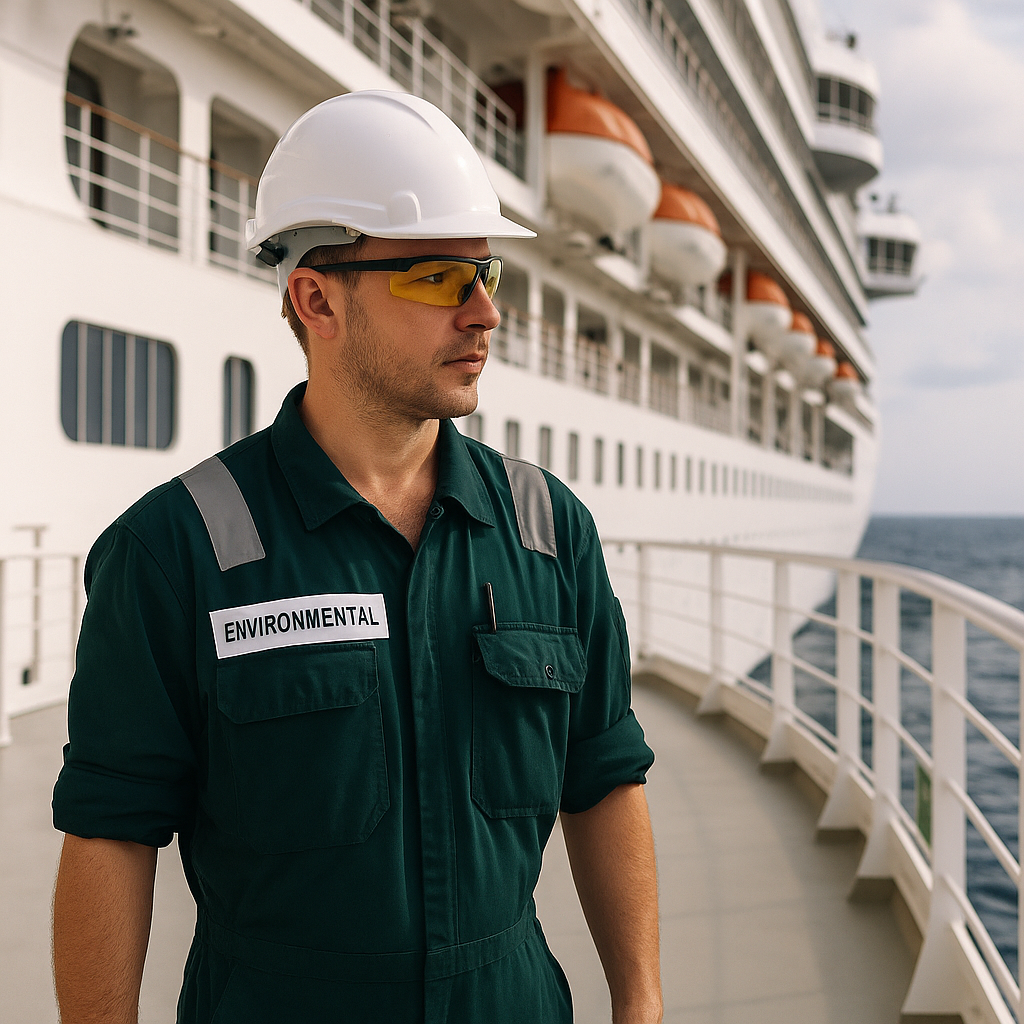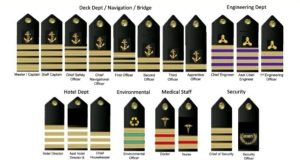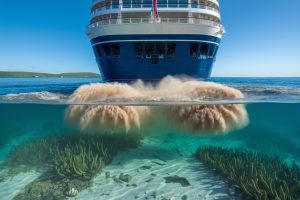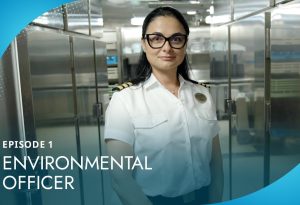The cruise and passenger ship industry is a thriving sector, offering luxury travel experiences to millions of passengers worldwide. However, its environmental impact cannot be overlooked. The role of the environmental department and the Environmental Officer (EO) is crucial in managing and mitigating these impacts, ensuring compliance with international regulations, and promoting sustainable practices onboard.
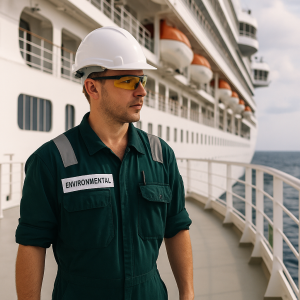
The Importance of Environmental Management on Ships
Cruise and passenger ships operate in delicate marine ecosystems, where pollution and resource consumption can have significant consequences. Waste management, air emissions, and energy efficiency are critical areas of focus. An effective environmental management system onboard ensures that these operations are conducted in an eco-friendly and compliant manner. The International Maritime Organization (IMO) plays a pivotal role in regulating environmental standards for the maritime industry, including MARPOL (Marine Pollution) Convention, and the IMO 2020 sulfur cap. The environmental department and Environmental Officer are tasked with implementing these regulations on ships.
Responsibilities of the Environmental Department
The environmental department on cruise and passenger ships is responsible for overseeing sustainability initiatives and ensuring compliance with international environmental laws. This team works closely with various shipboard departments, including engineering, housekeeping, and food services, to minimize the ship’s ecological footprint. Key responsibilities include:
- Monitoring Waste Management: Ensuring proper segregation, treatment, and disposal of solid and liquid waste, including sewage and gray water. Advanced waste management systems such as bio-digesters and incinerators are often utilized.
- Air Emissions Control: Overseeing the use of exhaust gas cleaning systems (scrubbers) and transitioning to low-sulfur fuels or alternative energy sources like Liquefied Natural Gas (LNG).
- Energy Efficiency Initiatives: Implementing energy-saving technologies such as LED lighting, optimized HVAC systems, and hull-cleaning schedules to reduce fuel consumption.
The Critical Role of the Environmental Officer
The Environmental Officer is a specialized role dedicated to maintaining and enhancing environmental performance onboard. As the ship’s environmental advocate, the EO ensures that all environmental policies are implemented effectively.
Key Duties of an Environmental Officer:
Regulatory Compliance : The Environmental Officer (EO) is the ship’s primary guardian of environmental laws and regulations, ensuring strict adherence to international, regional, and port-specific requirements. They are responsible for implementing the provisions of MARPOL (International Convention for the Prevention of Pollution from Ships), including regulations under Annex I to Annex VI, which govern oil pollution, sewage, garbage, air emissions, and ballast water management. The EO collaborates with the ship’s master and engineering team to ensure equipment such as oil-water separators, sewage treatment plants, and exhaust gas cleaning systems (scrubbers) operate within legal limits. Additionally, they are well-versed in the Ballast Water Management Convention, ensuring ballast water is treated and discharged without introducing invasive marine species. The EO also maintains familiarity with local port regulations, ensuring the ship’s operations align with varying environmental requirements across different regions.
Crew Training and Awareness : A critical part of the EO’s role is fostering an environmentally responsible culture among the crew. Regular training sessions are conducted to ensure crew members understand best practices in pollution prevention and waste management. For example, crew members are trained to properly segregate waste, manage hazardous materials, and handle bilge water. The EO also oversees emergency response drills, preparing the crew to respond effectively to environmental incidents such as oil spills or accidental discharge of untreated sewage. Training often includes updates on new regulations, emerging technologies, and company-specific sustainability goals, ensuring the entire team is well-informed and proactive in their duties.
Documentation and Reporting: The EO maintains comprehensive records of all environmental activities onboard, which are essential for demonstrating compliance during inspections and audits. This includes waste disposal logs, detailing the volume and type of waste processed and discharged, as well as emissions records to monitor compliance with sulfur and nitrogen oxide limits under MARPOL Annex VI. Reports also cover ballast water discharge activities, oil-to-sea interfaces, and any environmental incidents, including near-misses. These records are not only reviewed by port state control officers and classification societies but also contribute to the company’s sustainability reporting and compliance audits. The EO ensures that documentation is accurate, up-to-date, and prepared for scrutiny at all times.
Auditing and Inspections: Environmental Officers play a proactive role in auditing the ship’s environmental systems and procedures. These audits involve detailed inspections of equipment such as sewage treatment plants, oily water separators, and waste management systems to ensure they are operating effectively and meet all required standards. Audits may also include checking that waste segregation practices are being followed, evaluating the efficiency of energy-saving measures, and verifying the accuracy of records and logs. The EO works closely with external inspectors, such as classification society surveyors and port state control officers, facilitating smooth and transparent inspections. If non-compliance or inefficiencies are identified, the EO develops corrective action plans, ensuring that issues are promptly addressed to maintain the highest environmental standards.
Why Environmental Officers Are Vital for Sustainable Cruising
Environmental Officers are instrumental in transforming the cruise industry toward sustainability. By implementing eco-friendly practices and fostering a culture of environmental responsibility among crew and passengers, they ensure that cruise ships operate with minimal ecological impact. These officers typically work aboard large cruise ships, where environmental management is crucial due to the significant potential for environmental impact. They are an integral part of the ship’s hierarchy, reporting directly to the Captain or Staff Captain, depending on the cruise line’s organizational structure. Environmental Officers also collaborate closely with the Chief Engineer and other senior officers to ensure compliance with international maritime regulations, such as MARPOL, and to oversee waste management systems, water treatment plants, and air emission controls onboard.
For instance, many Environmental Officers lead initiatives to reduce single-use plastics onboard, introduce sustainable food sourcing, and enhance recycling programs. They also work to raise passenger awareness through educational programs and environmental workshops, fostering a shared responsibility for the preservation of marine ecosystems. In addition to their proactive initiatives, Environmental Officers play a critical role in ensuring that the ship’s operations meet stringent environmental standards. They receive orders and guidance from both the cruise company’s shore-side environmental teams and regulatory bodies, ensuring that the ship adheres to international and company-specific sustainability protocols.
By bridging operational practices with environmental stewardship, Environmental Officers are at the forefront of creating a greener and more sustainable future for the cruising industry.
Career Opportunities as an Environmental Officer
With the growing emphasis on sustainable practices in the maritime industry, the demand for skilled Environmental Officers is on the rise. Aspiring professionals often require a background in environmental science, marine engineering, or maritime law, along with certifications in areas like MARPOL compliance and waste management. Environmental Officers typically work on large cruise lines, such as Carnival, Royal Caribbean, and Norwegian Cruise Line, which prioritize environmental sustainability as part of their corporate responsibility.
The environmental department and Environmental Officer play an indispensable role in making cruise and passenger ships more sustainable. From managing waste and emissions to educating the crew and passengers, their efforts ensure compliance with environmental regulations while promoting a greener future for the maritime industry. As the cruise sector continues to grow, the importance of environmental stewardship cannot be overstated. Investing in skilled Environmental Officers and robust environmental management systems is essential for protecting our oceans and ensuring the long-term viability of this industry.

